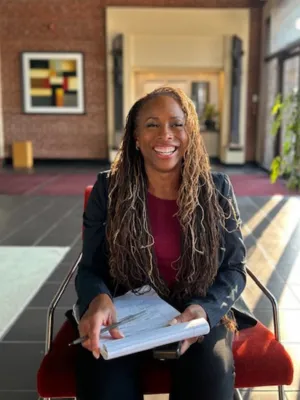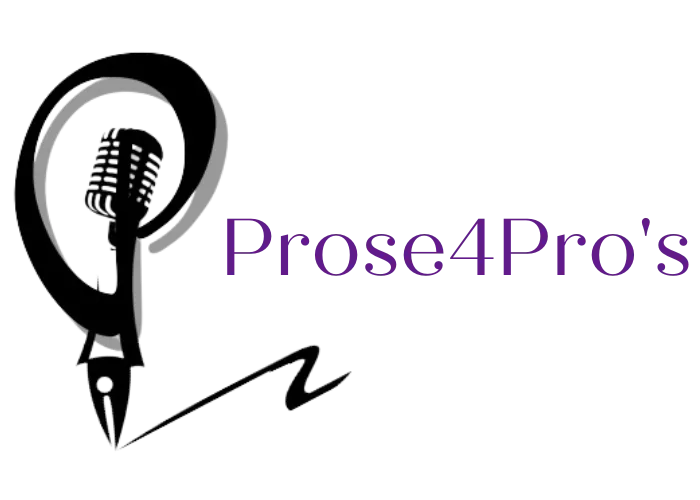
The #1 Reason you think you're not a good writer (and how to fix that)
The #1 reason you think you're not a good writer
Helane Androne
English Professor | Writing Life Coach | Actor & VO Artist
December 7, 2023
Open Immersive Reader
(And how to fix that)
Today, I want to talk to my Creatives who don’t feel like "great" or even “good” writers. This one is for those of you who get paralyzed by the page, or are stuck wondering whether you need to take a writing class. Or, you’re wondering which handbook you need to buy to get the job done. Now, there’s nothing wrong with classes or handbooks, but there are a few things you should consider before you go down some sadly familiar road.
I don't know how many times I've talked to smart, capable professionals who start our conversation with, "I'm not a good writer...Should I take a class?" My answer is always the same: That depends on how much time you want to invest–and what your goals are. Is your goal to be a full-time writer? Do you want to teach others to write? Do you want to use writing to meet some specific professional goals? Those are all VERY different aims that usually carry very different time and financial investments. However, no matter what the answer to those questions might be, first you need to get past the burden of thinking that you're not a "good" writer, so you can access the brilliance you carry as a Creative professional. Changing your thinking about writing is absolutely key to knocking down the blocks that have gotten in the way of your brilliance.
We need to unpack that mindset, so let's get you together!
I am going to offer you a path for a mindset change that will help you start asking the right questions that will ultimately impact your writing.
To start, what do you THINK about writing? No, not what do you think about yourself as a writer. What do you think about writing?
Our relationship to writing is so powerful. Having the confidence to communicate in writing is cultivated. It’s trained into us very early on in our lives. So is the destruction of that confidence. Before you generate that hard-hitting, focused and brilliant content, you have to have a positive mindset about writing.
Where do we start? We start with your writing experience.
Your relationship to writing, and how confident you feel about it, is likely dependent on the model you’ve been exposed to most, or the one to which you assign the most value. Here’s the point: most of us took writing classes in school. That means, good or bad, we’ve definitely had some kind of training in things like grammar, mechanics, spelling, diction, and syntax.
And if you remember what all of those words mean, you probably have some scary stories to tell. If you don’t remember what all those words mean, then you definitely have some scary stories to tell!
But why did you have that good or bad writing experience? Why did so many people come out of their early writing classes either convinced of their writing genius, or traumatized by their writing struggles? Well, after more than 20 years of teaching non-traditional students with very diverse experiences, I have learned that it boils down to your writing mindset. And that was shaped by learning context and learning style.
The grown folks of us were taught to write under an Industrial Revolution model of schooling that was all about getting a large group of people through a lot of information for the purpose of getting them to a similar level of skill. This model is about educating workers for vocational work and civic virtue. Yep, that's right: think public (and some private/charter) schools. Back in the day, school was designed to make you a "productive citizen." And it probably did that. If you're a professional, you’re probably pretty productive, right? Do you remember classes like Mechanics, Civics, Home Economics, and Wood-shop? Today, schools vary around the city, region, and country, but they tend to still have something in common: the model remains pretty consistent. (We can argue about--ahem, discuss--the details of course offerings later. Also, I took Wood-shop.)
Within this same context, it's likely that some people found themselves leaning into writing--and thinking happy thoughts about it--because their primary learning styles fall into categories that connect to reading and writing. You know the types–the ones who love to read ALL the words on the page and write tons of their own words on a page. The ones who say words like "prolific" in conversations that don't require words like "prolific." For the record, these might be the same people who might have a small tantrum or panic attack because they can’t bend a Transformer back into a car without written instructions in at least two languages (WHY are those toys so COMPLICATED??!!).
I digress.
Here's the deal: If your primary learning styles fall into other kinds of smart, then you may have struggled with your thoughts about writing a bit more than the "prolific" types. Or a LOT more. For many of us, those old school contexts typically taught us how to learn in a large group, "how to become an upstanding, working citizen" model, while also implicitly teaching us that being successful at writing in that context means you are "good" and being unsuccessful in that context means that you are "bad" (at writing). And, for many people, what has remained from that experience is some problematic thoughts about writing.
For example, maybe you’re one of those hands-on, kinesthetic and/or visual learning types who can somehow, miraculously, with crazy accuracy, make things look realistic, unique, or visually beautiful. Like with pencils and paint and other crafty stuff like that. Or, you can fix real things, without multilingual instructions--with your actual hands. Or, maybe you’re one of those people who can actually focus while simultaneously sitting outside in nature with animals, insects, and sounds–without endlessly smacking imaginary bugs off yourself, or being distracted because you’re busy worrying about whether there’s a mosquito in your wine glass. (Stop judging me.)
So, what does how you learned back then have to do with how you think about writing right now? Well, if you had to work harder than others at reading and writing, in a learning model that didn't complement or engage your particular genius, then you came to a logical conclusion based on the judgments within that limited context: I must not be a good writer.
The number 1 reason so many people believe they aren't good writers? Their current writing mindset is blocked, or still trying to connect to, an old writing context.
So how do we fix that? We create a new context for your creativity.
First, we have to acknowledge that the context that created your thinking about writing impacted your confidence. To release your voice, your creativity, or bloom your gifts, you need a different model for learning because those are different goals. So it makes sense that the reason you think you can’t write is that you've been trying to achieve creative goals from traditional, standardized methods. That old system taught you the basics you need to write for someone else’s needs and vision. That was kind of the point. If you want to do more than that, if you’re called to do more than that, but you need to be a better writer to get your vision built, then you need to recover your confidence by finding a writing context that complements your unique style.
Every stage of our lives, every goal that we have, is best served through a model that is most responsive to our current patterns and intentions.
Ready to shift that old model mindset to something useful? Well, buckle up. I have one affirmation for you that has been transformative for Creatives looking to get past their writing mindset barriers to level up their writing.
Mindset shift: I CAN write well with the right models and mentors.
If you’ve managed to move through the professional world communicating with others, then I believe that you CAN write well. And you should believe that, too. This mindset shift reveals two steps that will make a real difference in your writing life: the right model for learning and the right mentors for inspiration.
First things first: Seek out a model for approaching writing that is based on your learning style. If you work best in small, directed groups, seek out opportunities to engage writing that way. For example, if you're a hands-on, nature loving learner, you'll thrive in writing retreat contexts or small workshops. If you're a visual or auditory learner, you might thrive engaging writing in vibrant online slide-rich webinars or in-person events.
Finally, you need to find the right MENTORS to inspire your own writing. A lot of Creatives are trying to use handbooks that are designed for styles that don’t match their own, which is the same as taking another writing class that is built for people who are already good at writing. Creatives usually need something more interesting than another well-meaning handbook. We need writing mentors.
Writing mentors are those texts (written, verbal, or visual) that magnetize you. There’s something about how they communicate that draws you in and holds your attention. Seek out those texts and look at what they do in their writing that inspires you. And just like you would do with a person, take that inspiration, practice using those tools, and then put your own style on it.
You can be a better writer.
I'm willing to bet that you're already better than you think. You just need the right context to release your Creative self.
Listen, if you are a Creative with a project that you know needs a jumpstart, or you have a vision that you know needs to get built, but you’ve been procrastinating, or you want help writing your path forward into monetizing your gifts…ESPECIALLY if you want to do it on a solid foundation that is sustainable for the long term, find me at: https://linktr.ee/drhelanewrites.
AND, if you want more quick tips like this, you can follow me on Instagram, TikTok, or Youtube @drhelanewrites. I’ll see you there!
Follow Me!


Facebook
Instagram
LinkedIn
Youtube
TikTok